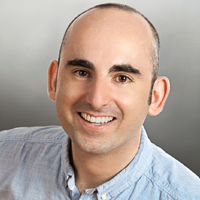
Exploring Database Operators in Heterogeneous Hardware Environments
Viktor Rosenfeld was a Research Associate at BIFOLD and part of the" Database Systems and Information Management" research group led by Professor Dr. Volker Markl, where he defended his thesis last winter. He loves solving complex puzzles, like optimizing data processing across central processing units (CPU) and graphics processing units (GPU).
Please describe and explain your research focus?
Viktor: I am a passionate software developer. As a doctoral student in the Database Systems and Information Management research group I was involved with a specific type of software: database operators for vast amounts of data. Database operators are the building blocks that ultimately process the data. These operators run on processors in computers and cell phones, but also in supercomputers. However, these processors are quite heterogeneous in structure. This raises the question how software can run optimally in such a heterogeneous hardware environment. How can optimal data management for large data volumes be achieved under these circumstances?
My dissertation “Query Processing on Heterogeneous Systems” focuses on database operators that run primarily on CPUs and GPUs. My approach is that a database should independently and automatically adapt the implementation of the code that processes the data, so that it is perfectly optimized for the respective processor on which the database is currently running.
What personally motivated you to enter this specific research-field?
Viktor: I want to make the world a little better – and I want to do it with good software. As a student at Humboldt University of Berlin, I worked in a the area of corpus linguistics. This field of linguistics explores language structure by analyzing annotated collections of text. These corpora do not have to be large. The challenge is that the annotation structures are complex. You can analyze this treasure trove of data according to certain criteria and with a specific research goal. At the HU, we developed a system called ANNIS that is still used in research and teaching today. It is an excellent feeling to be involved in creating meaningful software.
Which major innovation do you expect in your research field in the next ten years?
Viktor: In the future, advances in processor hardware will make it possible to perform complex machine learning tasks on our mobile devices, instead of in the cloud. This hardware already exists today, but we are still at the beginning. In the next few years, our mobile devices will have not only CPUs and GPUs but also processors specialized for machine learning, called neural processing unit or NPUs. This would have advantages for our privacy because, with the help of the NPUs, we will no longer have to send our sensitive data to the cloud for external processing. In addition, such NPUs could lead to AI models being adapted to the respective user, and everyone would have their individual AI.
Which living or historical scientist has fascinated you and why?
Viktor: In school, I was fascinated by Georg Mendel, who laid the foundations of genetics with the help of peas and his extraordinary powers of observation - when nobody knew what a gene was or that DNA existed.
AI is considered a disruptive technology - in which areas of life do you expect the greatest upheaval in the next ten years?
Viktor: We don't need to be afraid of AI. Yes, our society is shaped by technology. At the same time, we are social beings. We will always prefer to interact with people rather than with machines. If I need medical advice, I will go to a doctor, not on the internet. I want to have real people to ask questions, not chatbots. Of course, the doctor will use AI tools as part of his work, for example, to improve diagnosis. AI will bring incremental improvements above all. If you are looking for disruption – in a positive way, you can observe how AI changes materials science or medicine. Think, for example, of AlphaFold, a startup that can calculate the folding of proteins, thus opening up entirely new dimensions for finding cures.
Where would one find you, if you are not sitting in front of the computer?
Viktor: I'm in a pop choir, the ok!choir. It's my happy place. We sing once a week. My highlight are our pop-up performances in a park or in front of a train station.


